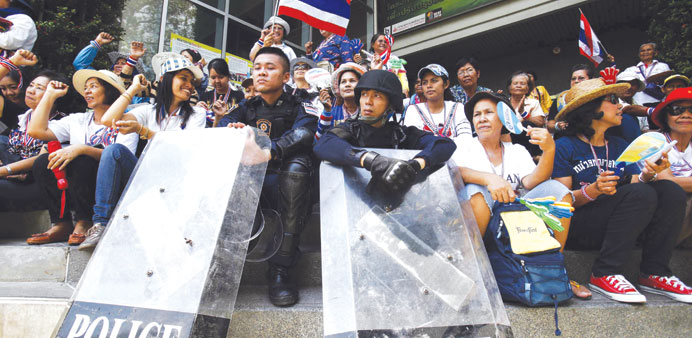Anti-government protesters sit with riot policemen outside the National Broadcast Services of Thailand (NBT) television station in Bangkok yesterday. The interim government is hoping to organise a July 20 election that it would probably win, but the protesters want the government out, the election postponed and reforms to end the influence of Yingluck’s brother, former premier Thaksin Shinawatra.
AFP
Thai police yesterday fired tear gas and water cannon at protesters mounting a “final fight” to topple the embattled government, two days after the prime minister was stripped of office.
Thousands of protesters left their main encampment in a park in the city’s commercial district as their firebrand leader Suthep Thaugsuban issued a rallying cry for them to establish a parallel government.
Fanning out into several groups they also surrounded a number of free-to-air television stations, saying they had interrupted broadcasts by authorities, as fears simmered of street clashes between rival political groups.
Police briefly used water cannon to hold off a hardcore group of anti-government protesters led by a Buddhist monk, who were attempting to enter a fortified police club.
“At first police fired water cannon, but protesters tried to get into the police club so they fired one can of tear gas,” Paradorn Pattanatabut, a security adviser to the government said.
The city’s Erawan Emergency Centre said five people were injured at the police club, without giving details.
The protesters’ action adds risk to a highly combustible situation with rival pro-government “Red Shirts” due to mass in the city suburbs today, as Thailand’s political crisis lurches into a dangerous new phase.
At least 25 people have been killed and hundreds more left wounded in gun and grenade attacks linked to six months of anti-government protests.
Both sides have hardcore armed supporters and Thailand’s recent history has been scarred by bouts of political violence.
Although buffeted by the Constitutional Court’s removal of Prime Minister Yingluck Shinawatra on abuse of power charges on Wednesday, the current Puea Thai administration has staggered on and appointed a new premier.
But the Red Shirts are outraged at Yingluck’s being deposed, accusing the court of acting in cahoots with the street mob to boot out a third premier linked to their hero -Yingluck’s billionaire brother Thaksin.
Niwattumrong Boonsongpaisan, who was swiftly appointed to replace Yingluck, is a Thaksin-loyalist.
“We are angry... we are ready to fight, we will not use violence but the power of the people to fight for democracy,” Kwanchai Pripana, a Red Shirt leader, said, adding he would lead tens of thousands to today’s rally from the Shinawatra-loyalist Udon Thani province.
Thaksin, who lives in exile to avoid a corruption conviction, was himself ousted as premier in an army coup in 2006, sending the country spinning into a political crisis that has lasted eight years to date.
Anti-government leader Suthep earlier urged the Thai Senate and Supreme Court to help overthrow the bloodied government.
“We will regain our sovereign power and set up a people’s government and a people’s legislative council,” he said.
Suthep, a former deputy prime minister for the now opposition Democrat Party, is known for his hyperbolic statements and, with the government weakened but still standing, the call for a unilateral administration appears to lack any legal ground.
On Thursday the government won a legal reprieve as the kingdom’s anti-graft panel stepped back from hauling more cabinet members into a separate indictment against Yingluck over a costly rice subsidy scheme.
There were fears the agency could have moved against the remainder of the government to complete a “judicial coup” and create a power vacuum that could have been filled by an appointed leader, as desired by the anti-government protesters.
They broadly come from the Bangkok-based establishment and middle-class, backed by royalist southerners, and revile Thaksin, who they accuse of massive corruption and perceive as a threat to the nation’s beloved but ailing king.
They also allege the Shinawatras have drained the kingdom’s coffers to sweeten Thaksin’s rural electoral base in the poor but populous north and northeast, with populist policies such as the rice subsidy.
Thaksin’s rural heartlands have powered his parties into power in every election since 2001, praising him for recognising their growing political and economic aspirations.
They accuse the Bangkok elite of attempting to steal power undemocratically.

